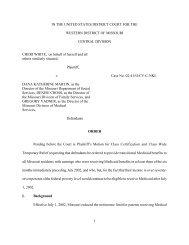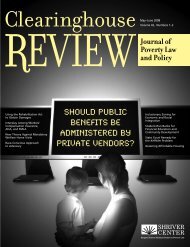The Role of the Courts in Securing Welfare Rights and ...
The Role of the Courts in Securing Welfare Rights and ...
The Role of the Courts in Securing Welfare Rights and ...
Create successful ePaper yourself
Turn your PDF publications into a flip-book with our unique Google optimized e-Paper software.
<strong>Welfare</strong> Law CenterThompson, 67 <strong>the</strong> United States Supreme Court held that this was unconstitutional because itclassified people upon <strong>the</strong> basis <strong>of</strong> <strong>the</strong>ir exercis<strong>in</strong>g <strong>the</strong> fundamental constitutional right to migrate,<strong>and</strong> <strong>the</strong>n penalized <strong>the</strong>m for exercis<strong>in</strong>g that right. Because a fundamental right was <strong>in</strong>volved,“strict scrut<strong>in</strong>y” was applied. <strong>The</strong> state could not come up with a legitimate reason, s<strong>in</strong>ce <strong>the</strong>Court said <strong>the</strong> real reason, try<strong>in</strong>g to keep poor people from mov<strong>in</strong>g <strong>in</strong>to a state was an <strong>in</strong>validpurpose under <strong>the</strong> Constitution.In recent years a number <strong>of</strong> states have adopted provisions to provide lower benefits tonew state residents, <strong>and</strong> a provision <strong>of</strong> <strong>the</strong> federal welfare law approves such restrictions. Anumber <strong>of</strong> challenges were filed, <strong>and</strong> virtually all were successful <strong>in</strong> <strong>the</strong> lower courts. 68On May17, 1999 <strong>in</strong> a major victory, <strong>the</strong> Supreme Court agreed by a 7-2 vote <strong>in</strong> Saenz v. Roe 69 that suchrestrictions were unconstitutional because <strong>the</strong>y violated <strong>the</strong> right to travel <strong>and</strong> resulted <strong>in</strong>unconstitutional discrim<strong>in</strong>atory treatment <strong>of</strong> citizens <strong>of</strong> a state.Different benefit levels based on race. If different treatment is based upon race, <strong>the</strong>strict scrut<strong>in</strong>y test is applied. So if a state said that African-Americans would get lower benefitsthan whites, that classification would be struck down.Texas paid much lower benefits <strong>in</strong> its AFDC program than its old-age program, eventhough most <strong>of</strong> <strong>the</strong> AFDC recipients were m<strong>in</strong>orities <strong>and</strong> most <strong>of</strong> <strong>the</strong> elderly were white. InJefferson v. Hackney, 70 <strong>the</strong> Supreme Court said that this was not a denial <strong>of</strong> equal protection.<strong>The</strong> Court said that <strong>the</strong> “mere” fact that <strong>the</strong>re was such a differential impact did not make <strong>the</strong>different benefits levels unconstitutional. In order for <strong>the</strong> difference to be a violation <strong>of</strong> <strong>the</strong>Constitution, <strong>the</strong>re has to be a show<strong>in</strong>g <strong>the</strong>re was an <strong>in</strong>tention to discrim<strong>in</strong>ate. However, where<strong>in</strong>tent is shown courts have struck down <strong>the</strong> differential treatment. A welfare case <strong>in</strong>volv<strong>in</strong>g<strong>in</strong>tentional racial discrim<strong>in</strong>ation was Whitfield v. Oliver. 71Discrim<strong>in</strong>ation aga<strong>in</strong>st legal immigrants.State welfare laws deny<strong>in</strong>g benefitsto or impos<strong>in</strong>g durational residency requirements on non-citizens resid<strong>in</strong>g lawfully <strong>in</strong> <strong>the</strong> countrywere <strong>in</strong>validated <strong>in</strong> Graham v. Richardson. 72<strong>The</strong> court applied <strong>the</strong> strict scrut<strong>in</strong>y test becauseclassifications based on alienage are <strong>in</strong>herently suspect.May 1999⋅ 28 ⋅








